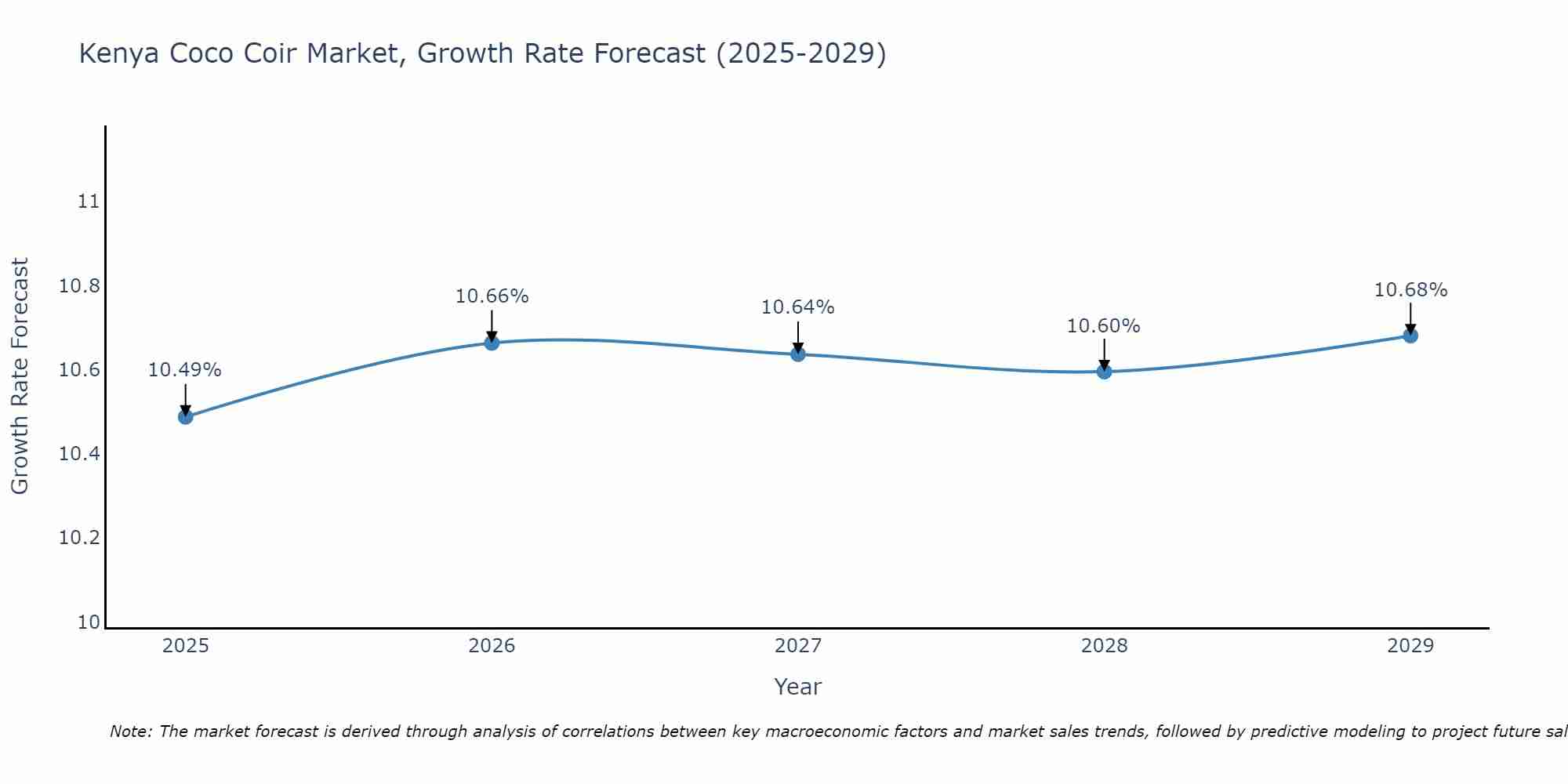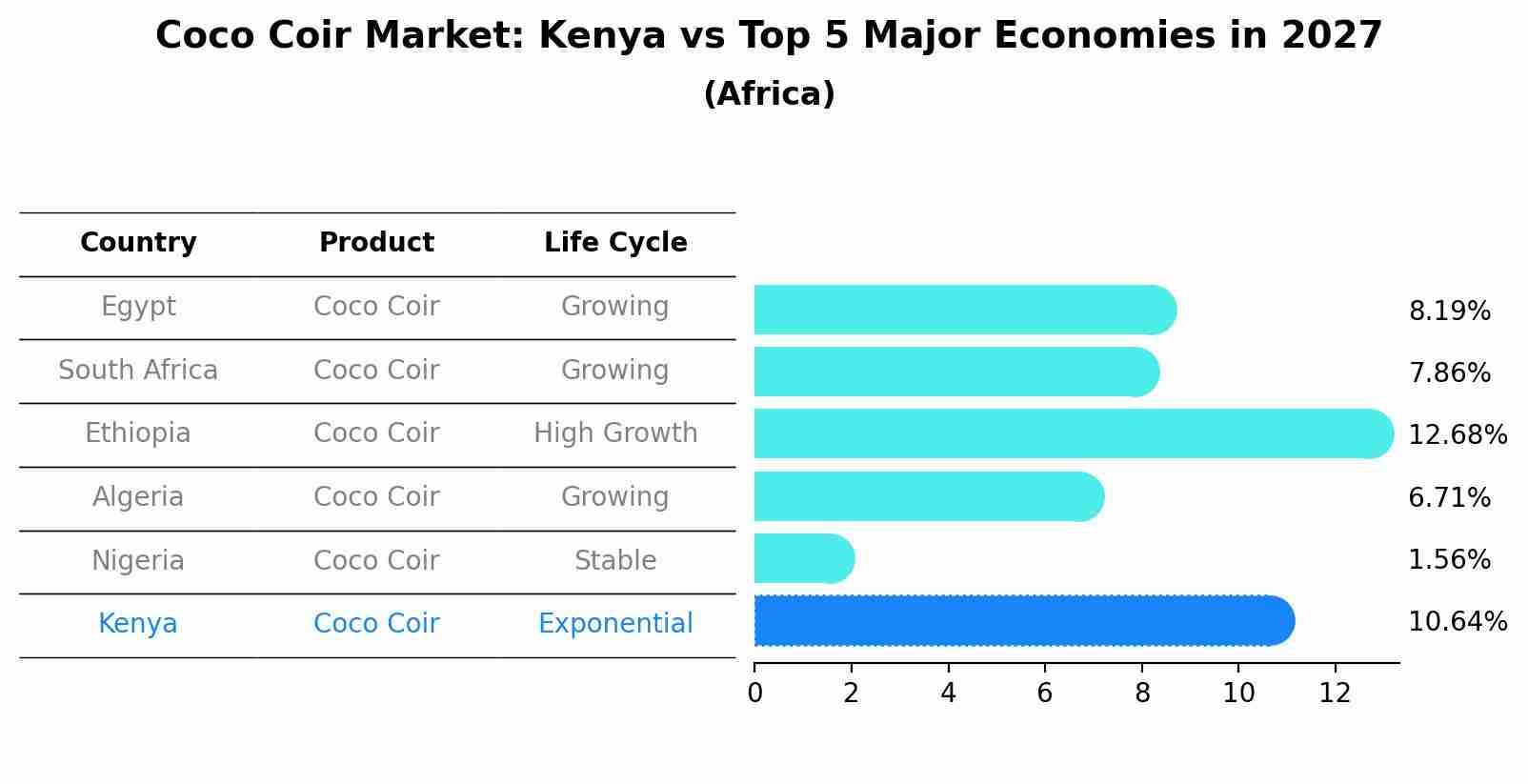Kenya Coco Coir Market Outlook | Industry, Revenue, Analysis, Value, Growth, Forecast, Trends, COVID-19 IMPACT, Companies, Share & Size
| Product Code: ETC373730 | Publication Date: Aug 2022 | Updated Date: Jul 2025 | Product Type: Market Research Report | |
| Publisher: 6Wresearch | Author: Sumit Sagar | No. of Pages: 75 | No. of Figures: 35 | No. of Tables: 20 |
Kenya Coco Coir Market Size Growth Rate
The Kenya Coco Coir Market is projected to witness mixed growth rate patterns during 2025 to 2029. From 10.49% in 2025, the growth rate steadily ascends to 10.68% in 2029.

Coco Coir Market: Kenya vs Top 5 Major Economies in 2027 (Africa)
In the Africa region, the Coco Coir market in Kenya is projected to expand at a high growth rate of 10.64% by 2027. The largest economy is Egypt, followed by South Africa, Ethiopia, Algeria and Nigeria.

Kenya Coco Coir Market Synopsis
The Kenya Coco Coir market is experiencing steady growth driven by the increasing awareness about sustainable agricultural practices and the rising demand for organic products. Coco coir, derived from coconut husks, is a versatile growing medium used in hydroponic systems, horticulture, and landscaping applications. The market is characterized by the presence of both local manufacturers and international suppliers, offering a range of coco coir products such as coco peat, coco chips, and coco fiber. Key factors contributing to market growth include the growing trend towards organic farming, the superior water retention and aeration properties of coco coir, and its eco-friendly nature. Government initiatives promoting agricultural sustainability and the expansion of commercial farming activities further propel the demand for coco coir in Kenya.
Kenya Coco Coir Market Trends
The Kenya Coco Coir Market is experiencing significant growth driven by the increasing demand for organic and sustainable growing mediums. The trend towards eco-friendly products in agriculture is leading to a rise in the use of coco coir, as it is a renewable and biodegradable alternative to traditional soil. Additionally, the superior water retention and aeration properties of coco coir make it a preferred choice for horticultural applications, including hydroponics and greenhouse cultivation. The market is also witnessing a surge in demand for value-added coco coir products such as coco peat and coco chips, further driving market expansion. With a growing emphasis on environmental conservation and sustainable farming practices, the Kenya Coco Coir Market is poised for continued growth in the foreseeable future.
Kenya Coco Coir Market Challenges
In the Kenya Coco Coir Market, several challenges are faced including limited awareness among farmers about the benefits of coco coir as a growing medium, inadequate supply chain infrastructure leading to high transportation costs, and inconsistent quality of coco coir products available in the market. Additionally, the competition from traditional growing mediums such as peat moss and soil poses a challenge in convincing farmers to switch to coco coir. Lack of standardization in product specifications and varying prices of coco coir also add complexity to the market dynamics. Addressing these challenges will require educating farmers about the advantages of coco coir, improving the supply chain efficiency, ensuring consistent quality control measures, and establishing industry standards to promote the growth of the coco coir market in Kenya.
Kenya Coco Coir Market Investment Opportunities
The Kenya Coco Coir market presents a promising investment opportunity due to the increasing demand for sustainable and eco-friendly products in agriculture and horticulture sectors. Coco coir, made from coconut husks, is a natural alternative to peat moss and is known for its water retention and aeration properties, making it a popular choice for soil conditioning and growing media. With the rise of organic farming practices and the growing awareness of environmental sustainability, the demand for coco coir products is expected to continue to grow in Kenya and globally. Investing in the Kenya Coco Coir market, either through production or distribution channels, could offer attractive returns as the market expands and consumers seek more environmentally friendly options for their agricultural needs.
Jordan Agar Market Government Policies
The Kenyan government has implemented various policies related to the coco coir market to promote sustainable development and support the agricultural sector. These policies focus on enhancing agricultural productivity through improved soil health and water retention using coco coir as a growing medium. The government provides incentives and support for farmers to adopt coco coir technology, including training programs and subsidies for coco coir products. Additionally, there are regulations in place to ensure the quality and safety of coco coir products in the market. Overall, the government`s policies aim to drive growth in the coco coir industry, increase agricultural sustainability, and boost the country`s economy through enhanced agricultural practices.
Kenya Coco Coir Market Future Outlook
The Kenya Coco Coir market is expected to witness steady growth in the coming years due to increasing awareness about sustainable agricultural practices and the benefits of using coco coir as a growing medium. The rise in urbanization and demand for organic produce are driving the adoption of coco coir in horticulture and agriculture. Additionally, the government`s initiatives to promote eco-friendly farming practices and investments in the agricultural sector are further fueling market growth. With the growing trend of hydroponic farming and the preference for environmentally friendly alternatives to traditional soil, the Kenya Coco Coir market is poised for expansion. However, challenges such as supply chain disruptions and price fluctuations of raw materials could impact market dynamics in the future. Overall, the market is expected to experience a positive trajectory driven by sustainability trends and increasing agricultural activities in Kenya.
Key Highlights of the Report:
- Kenya Coco Coir Market Outlook
- Market Size of Kenya Coco Coir Market, 2021
- Forecast of Kenya Coco Coir Market, 2031
- Historical Data and Forecast of Kenya Coco Coir Revenues & Volume for the Period 2018 - 2031
- Kenya Coco Coir Market Trend Evolution
- Kenya Coco Coir Market Drivers and Challenges
- Kenya Coco Coir Price Trends
- Kenya Coco Coir Porter's Five Forces
- Kenya Coco Coir Industry Life Cycle
- Historical Data and Forecast of Kenya Coco Coir Market Revenues & Volume By Product for the Period 2018 - 2031
- Historical Data and Forecast of Kenya Coco Coir Market Revenues & Volume By Coco Coir Grow Bags for the Period 2018 - 2031
- Historical Data and Forecast of Kenya Coco Coir Market Revenues & Volume By Bales for the Period 2018 - 2031
- Historical Data and Forecast of Kenya Coco Coir Market Revenues & Volume By Coir Material for the Period 2018 - 2031
- Historical Data and Forecast of Kenya Coco Coir Market Revenues & Volume By Open Tops for the Period 2018 - 2031
- Historical Data and Forecast of Kenya Coco Coir Market Revenues & Volume By Blends & Loose Substrate for the Period 2018 - 2031
- Historical Data and Forecast of Kenya Coco Coir Market Revenues & Volume By Others for the Period 2018 - 2031
- Historical Data and Forecast of Kenya Coco Coir Market Revenues & Volume By Application for the Period 2018 - 2031
- Historical Data and Forecast of Kenya Coco Coir Market Revenues & Volume By Rope & Cordage for the Period 2018 - 2031
- Historical Data and Forecast of Kenya Coco Coir Market Revenues & Volume By Coco Nets & Twines for the Period 2018 - 2031
- Historical Data and Forecast of Kenya Coco Coir Market Revenues & Volume By Stitched Mats for the Period 2018 - 2031
- Historical Data and Forecast of Kenya Coco Coir Market Revenues & Volume By Coconut Meals for the Period 2018 - 2031
- Historical Data and Forecast of Kenya Coco Coir Market Revenues & Volume By Husk for the Period 2018 - 2031
- Historical Data and Forecast of Kenya Coco Coir Market Revenues & Volume By Others for the Period 2018 - 2031
- Historical Data and Forecast of Kenya Coco Coir Market Revenues & Volume By Consumer for the Period 2018 - 2031
- Historical Data and Forecast of Kenya Coco Coir Market Revenues & Volume By Green Houses for the Period 2018 - 2031
- Historical Data and Forecast of Kenya Coco Coir Market Revenues & Volume By Sellers for the Period 2018 - 2031
- Kenya Coco Coir Import Export Trade Statistics
- Market Opportunity Assessment By Product
- Market Opportunity Assessment By Application
- Market Opportunity Assessment By Consumer
- Kenya Coco Coir Top Companies Market Share
- Kenya Coco Coir Competitive Benchmarking By Technical and Operational Parameters
- Kenya Coco Coir Company Profiles
- Kenya Coco Coir Key Strategic Recommendations
Frequently Asked Questions About the Market Study (FAQs):
- Single User License$ 1,995
- Department License$ 2,400
- Site License$ 3,120
- Global License$ 3,795
Search
Thought Leadership and Analyst Meet
Our Clients
Related Reports
- Canada Oil and Gas Market (2026-2032) | Share, Segmentation, Value, Industry, Trends, Forecast, Analysis, Size & Revenue, Growth, Competitive Landscape, Outlook, Companies
- Germany Breakfast Food Market (2026-2032) | Industry, Share, Growth, Size, Companies, Value, Analysis, Revenue, Trends, Forecast & Outlook
- Australia Briquette Market (2025-2031) | Growth, Size, Revenue, Forecast, Analysis, Trends, Value, Share, Industry & Companies
- Vietnam System Integrator Market (2025-2031) | Size, Companies, Analysis, Industry, Value, Forecast, Growth, Trends, Revenue & Share
- ASEAN and Thailand Brain Health Supplements Market (2025-2031) | Strategy, Consumer Insights, Analysis, Investment Trends, Opportunities, Growth, Size, Share, Industry, Revenue, Segments, Value, Segmentation, Supply, Forecast, Restraints, Outlook, Competition, Drivers, Trends, Demand, Pricing Analysis, Competitive, Strategic Insights, Companies, Challenges
- ASEAN Bearings Market (2025-2031) | Strategy, Consumer Insights, Analysis, Investment Trends, Opportunities, Growth, Size, Share, Industry, Revenue, Segments, Value, Segmentation, Supply, Forecast, Restraints, Outlook, Competition, Drivers, Trends, Demand, Pricing Analysis, Competitive, Strategic Insights, Companies, Challenges
- Europe Flooring Market (2025-2031) | Outlook, Share, Industry, Trends, Forecast, Companies, Revenue, Size, Analysis, Growth & Value
- Saudi Arabia Manlift Market (2025-2031) | Outlook, Size, Growth, Trends, Companies, Industry, Revenue, Value, Share, Forecast & Analysis
- Uganda Excavator, Crane, and Wheel Loaders Market (2025-2031) | Strategy, Consumer Insights, Analysis, Investment Trends, Opportunities, Growth, Size, Share, Industry, Revenue, Segments, Value, Segmentation, Supply, Forecast, Restraints, Outlook, Competition, Drivers, Trends, Demand, Pricing Analysis, Competitive, Strategic Insights, Companies, Challenges
- Rwanda Excavator, Crane, and Wheel Loaders Market (2025-2031) | Strategy, Consumer Insights, Analysis, Investment Trends, Opportunities, Growth, Size, Share, Industry, Revenue, Segments, Value, Segmentation, Supply, Forecast, Restraints, Outlook, Competition, Drivers, Trends, Demand, Pricing Analysis, Competitive, Strategic Insights, Companies, Challenges
Industry Events and Analyst Meet
Whitepaper
- Middle East & Africa Commercial Security Market Click here to view more.
- Middle East & Africa Fire Safety Systems & Equipment Market Click here to view more.
- GCC Drone Market Click here to view more.
- Middle East Lighting Fixture Market Click here to view more.
- GCC Physical & Perimeter Security Market Click here to view more.
6WResearch In News
- Doha a strategic location for EV manufacturing hub: IPA Qatar
- Demand for luxury TVs surging in the GCC, says Samsung
- Empowering Growth: The Thriving Journey of Bangladesh’s Cable Industry
- Demand for luxury TVs surging in the GCC, says Samsung
- Video call with a traditional healer? Once unthinkable, it’s now common in South Africa
- Intelligent Buildings To Smooth GCC’s Path To Net Zero


















